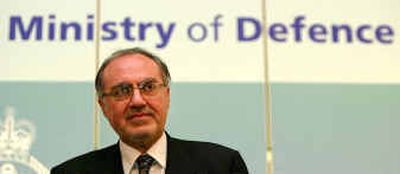Saddam foe nominated to lead Iraq

BAGHDAD, Iraq – Iyad Allawi, a Shiite doctor who survived an assassination attempt by agents of Saddam Hussein and later tried to overthrow the former dictator, was tapped Friday to be the new prime minister of the Iraqi interim government.
Allawi, a neurologist by training, will be the top official in the transitional government when it begins functioning with the transfer of sovereignty on June 30. Elections for a permanent government are scheduled for sometime before January 2005.
On Friday, the Iraqi Governing Council voted unanimously to nominate Allawi to the post of prime minister. A senior Bush administration official later confirmed that the choice is acceptable both to U.N. envoy Lakhdar Brahimi and the United States.
Even so, a number of U.S. officials, who spoke on condition of anonymity, expressed anger over the governing council’s role in essentially forcing the choice of Allawi. The United Nations had been given responsibility to choose the interim government. Some U.S. officials expressed fears that the selection process was another sign of confusion in the attempts to create a democracy in Iraq.
It was also apparent Friday that Brahimi would be unable to meet Bush’s goal of coming up by Saturday with a list of others who would be part of the interim government.
In a Monday night speech intended to reassure Americans that the transition was on track, Bush said Brahimi intended to produce his list by week’s end.
The senior administration official, who insisted on anonymity because of the sensitivity of the issue, said U.S. officials do not expect to get other names from Brahimi until Sunday, at the earliest.
Allawi led a group known as the Iraqi National Accord that was established in 1990 to oppose Saddam’s rule. The INA, which received CIA backing, was based in neighboring Jordan and composed primarily of military and security officers who had defected from Saddam’s regime.
Judith Yaphe, a Persian Gulf Expert at the Defense Department’s National Defense University who met Allawi a week ago, said Allawi, like many exiles, “doesn’t have much popular support in country.” However, she said, he carries less baggage than other exiles, such as Ahmed Chalabi, who were seen as being tools of Washington.
In an October 2003 poll conducted by the State Department, 69 percent of Iraqis said they had not heard enough about Allawi to express an opinion. Thirteen percent expressed a favorable view of him, and 17 percent had an unfavorable opinion of him. The poll was based on interviews of 1,444 Iraqis in urban areas around the country.
“We believe (Allawi) is able to run the government in this very critical period,” said Hamid al Kifaey, a spokesman for the 25-member Governing Council.
According to Kifaey, U.N. envoy Brahimi met with the council on Friday and agreed to the selection. L. Paul Bremer, the coalition administrator, also met with the council and congratulated the members “on a very distinguished choice,” said coalition spokesman Dan Senor.
In Washington, White House spokesman Scott McClellan called Allawi “a fine and capable leader who appears to have broad support among the Iraqi people.”